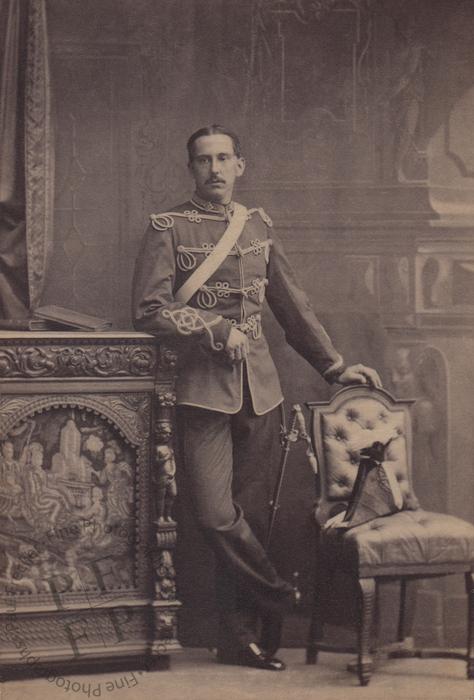Ensign William Owen Lanyon
(1842-1887)
30 September 1865
Volume 12, page 37, sitting number 16,683.
[A clipped letter heading accompanies the carte de visite, identifying ‘Head Quarter House / Jamaica’ as the sender’s address. Underneath this a period hand has inked ‘1865 Ensign Lanyon / A.D.C.’]
According to Hart’s Army List (1865), Ensign William Owen Lanyon joined the 6th (The Royal Warwickshire) Regiment of Foot by purchase on 21 December 1860. In 1865 the 1st Battalion of the regiment was stationed in Plymouth and the 2nd was in Jamaica. In 1866 he transferred to the 2nd West India Regiment.
‘Sir William was the son of Sir Charles Lanyon, an eminent architect in Belfast, who represented this city in Parliament from November, 1866, to November, 1868, by Helen, daughter of Mr. J. Owen, of the Board of Works, Dublin. He was born in county Antrim on the 21st of July, 1842, and in 1882 married Florence daughter of Mr J.M. Levy, of Grosvenor-street, W., but that lady died in the following year. Sir William was educated at Bromsgrove, and entered her Majesty’s service as ensign of the 6th Regiment when he was 18 years of age. In 1865 he was appointed aide-de-camp to the general commanding in the West Indies, and subsequently acted as private secretary to Sir J.P. Grant, Governor of Jamaica’ (Morning Post, 7 April 1887)
‘Information has been received in London of the death in New York of Sir William Owen Lanyon, after a long and painful illness. The deceased officer was aide-de-camp to General Wolseley in the Ashantee War, and acted as Colonial Secretary, receiving at the close of the war the Ashantee medal. He was subsequently administrator of the Government of Griqualand West, and commanded the expedition to punish the Chief Botlositsie in 1877, receiving the South African medal and being made C.B. For his services in the Zulu War he was made C.M.G. He was Colonel on the Staff and Commandant of the base of operations in the Egyptian expedition of 1882, receiving the medal and bronze star of the Egyptian campaign, and also the decoration of the Third Class of the Osmanieb. He was on a visit to America at the time of his death' (Whitstable Times and Herne Bay Herald, 16 April 1887).
What neither obituary mentions is that Lanyon's autocratic outlook and low opinion of the local peoples made him immensely unpopular during his terms of office. He famously referred to Griqualand West as the most 'hideous and disgusting' place he had ever seen.

